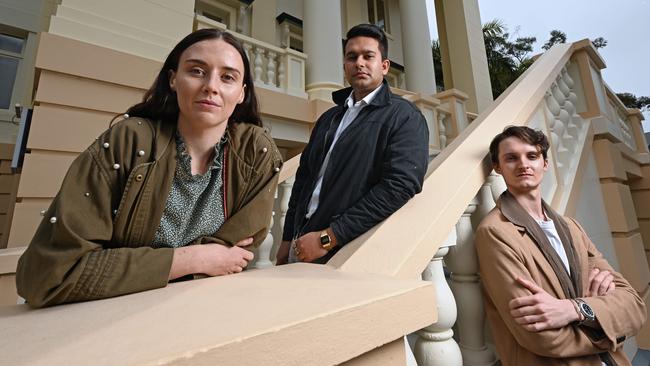Recycled study par for the course on post-Covid campus
Some of Australia’s top universities are offering online-only tuition, recycled subject material and ‘shadow courses’ despite charging hefty fees.

Some of Australia’s top universities are offering online-only tuition, recycled subject material and “shadow courses” – where new students are enrolled alongside postgraduates – despite charging hefty fees.
After the tertiary sector took a financial hit with the loss of foreign students during the pandemic, universities appear to have retained many cost-cutting measures or are failing to update courses in the first post-lockdown year.
When Hannah Bianchi returned to the Queensland University of Technology last year after graduating in 2017, she noticed a difference in quality.
With a timetable of online lectures using voiceovers and slides from previous years, the 29-year-old clinical exercise physiology student questioned why she was paying $60,000.
“I started studying again last year for this degree and it was dramatically different,” Ms Bianchi said. “It’s hard using recycled content because a lot of the time it’s not looked at before it’s reposted so there’s old dates when they’re referring to assessment items.”
The undergraduate said her fees did not justify a lack of engagement and if a lecture were online it should be livestreamed.
“Even if it could be an online lecture, it would be better if it’s live so I can see the lecturer delivering it, I can ask questions in real-time,” she said.
QUT guild president and law student Oscar Davison said Ms Bianchi was not alone.
“I have no doubt that there are students learning from recycled content still. The content that is made by QUT is owned by QUT so it’s kind of a good financial decision,” Mr Davison said.
QUT told The Australian that material was reviewed each time a course was offered, with certain subjects largely campus-based.
At the University of Queensland, students are concerned about classes that teach undergraduate and postgraduate students in the same room. They are referred to as “shadow courses”.
A postgraduate student enrolled in a “shadow course” said UQ was not following its policy that postgraduates be assessed differently. “There are many courses where the assessment is exactly the same, or if there is a different assessment it was obviously an afterthought,” the student said.
“You see the ads and think that your master’s degree is going to be a first-class experience. When you actually arrive, it feels a lot like you’re flying in cattle class.”
A UQ spokeswoman said such courses existed where postgraduate students did not have a background in the relevant discipline, resulting in some content being shared.
“There must be a clear distinction between the courses, including explicit assessment of postgraduate learning outcomes,” she said.
At La Trobe University, student union president Joel Blanch said the reliance on recycled recorded lectures meant the loss of feeling part of a cohort. “Having lectures online means that you aren’t sitting with your peers focused just on the lecture … I found that I was much less concentrated on the topic and much more concentrated on how quickly I could get through the lecture, so I’d play it at two-times speed,” Mr Blanch said.
La Trobe said about 84 per cent of its learning activities were offered on campus or with an option of online learning.
At the University of NSW, student union president Nayonika Bhattacharya said online study options were an extra tool, not a replacement.
“There’s no consensus so far within the teaching space about what hybrid learning means,’’ she said.
National Tertiary Education Union president Alison Barnes said funding cuts and increased workloads had put a strain on educators’ capacity to engage with students and regularly update content.
“Higher workloads also make it harder for lecturers and tutors to pick up academic issues early to ensure students are getting all the help they need,’’ she said.




To join the conversation, please log in. Don't have an account? Register
Join the conversation, you are commenting as Logout